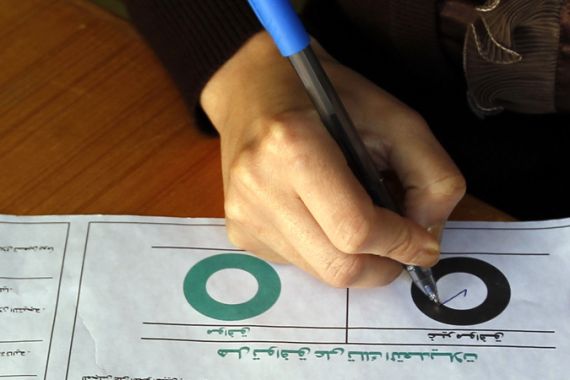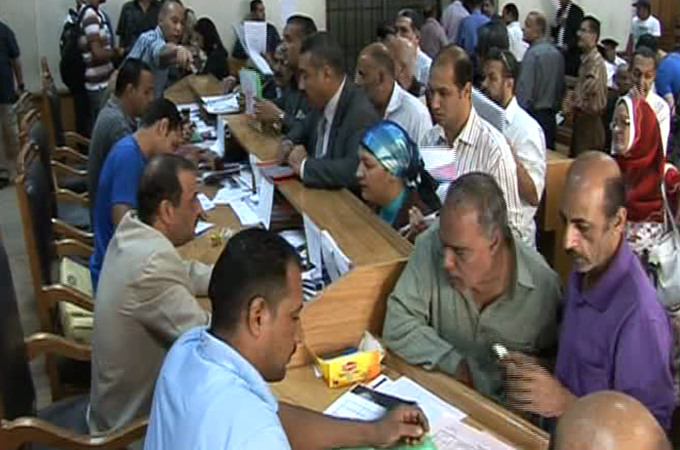Egypt elections: Those who cannot vote
Under Egypt’s laws, political prisoners can be lumped in with criminal record holders who are barred from voting.

 |
As Egypt prepares to begin what activists hope will be a new era in democracy – which promises to be as confusing as it is monumental – the first democratic elections in a country with more than 6,000 years of history are starting this month.
There has been a flurry of stories on issues facing candidates – charges of discrimination against female candidates, the questionable efficacy of a ban on preventing those with ties to deposed President Hosni Mubarak’s National Democratic Party from running etc. But little is known about a list of names, a list that some say is nearly 30,000 names long, identifying people who have been prohibited from voting due to past criminal convictions.
Disenfranchising former convicts is stipulated by Egyptian law – and many other countries have similar regulations when it comes to who can and cannot vote. And In a nation of more than 80 million, disenfranchising a few thousand might not seem like a big deal.
However, voters’ rights advocates take issue with two elements with the mechanism by which tens of thousands of criminal record holders are prohibited from voting in the upcoming parliamentary elections: The lack of transparency and the fact that the process relies on a database which seems to have no way of exempting former political prisoners from the list of banned voters.
“The overall lack of transparency that has typified the electoral process to date and the haste with which the structures are being implemented does not create confidence in the ability of the electoral authorities to be able to deal with those individuals who were unlawfully convicted under the previous regime, often for political offences,” said Michael Hanna, a fellow and analyst at the Century Foundation, a non-partisan think tank.
“This category of people might be effectively disenfranchised. Even if an appropriate legislative carve-out had been established, there is simply not enough time at this point in which to adjudicate the merits of such claims.”
Questionable transparency
Egypt’s Ministry of the Interior (MoI), in charge of compiling such a list, refused to make any comment on the list of former convicts. MoI spokesman Marwan Mustafa told Al Jazeera that the ministry is “no longer concerned with any technicalities in relation to elections” and its primary task was now to provide security within and outside voting stations.
Mustafa pointed to the High Commission for Elections as bearing the responsibility for those who are prohibited from voting.
But a spokesman for Egypt’s High Electoral Commission said that the list of former prisoners who are banned from voting remained “in the hands of the Ministry (of the Interior)” and will not be disclosed. He declined to say how many people were on the list.
The spokesman also said that former political prisoners – such as some members of the Muslim Brotherhood who were arrested in 2005 but were ultimately allowed to participate in the poll – will not be prohibited from voting or running in the poll.
However, according to Negad El-Borai, a Cairo-based attorney and rights activist, there’s no way of separating former political prisoners from other convicts.
“In Egypt, we don’t have anything called a political prisoner, because it’s not in the penal code – our legal system doesn’t identify something called ‘political crimes’ … they are just crimes – like killing,” said El Borai.
The country’s penal code, he said, stipulates that those found guilty of crimes of moral turpitude (“crime against dignity or honour”) such as fraud, bribery, supplying false testimony or information on a state document, will be barred from voting.
He said that once political activists found guilty of committing such crimes complete their sentences, they continue to face “another level of punishment”, not being able to vote.
“There is no system of appeal for such decisions,” he said.
He cites Ayman Nour as an example. Nour, a prominent opposition figure and a former presidential candidate, was found guilty in 2005 for forging documents needed to establish the El-Ghad Party. He tried to appeal his conviction in October but the bid was rejected, meaning as of now, Nour cannot run for the office of president.
“Everybody knows that Ayman Nour is a political prisoner, but in fact, if you go back to the papers, it’s not his crime,” said El-Borai.
“You must be very careful when you start to work in the political field of a third world country – this is one of the prices which you must pay, because of course the government will use it [the penal code] against some political leaders.”
Is disenfranchisement democratic?
Some say the disenfranchisement of former convicts – regardless of the nature of the crime committed – is undemocratic, especially in a country such as Egypt, where those politically opposed to a regime were considered criminals, and many civilians continue to face military tribunals, which lack transparency.
Ahmed Fawzy, head of the Egyptian Association for Community Participation Enhancement told Al Jazeera that the 1956 law (Number 73) which allows former convicts to be banned from voting is vaguely worded and could well extend to include anyone found guilty in an “exceptional court” or military tribunal.
“Those exceptional courts are – according to human rights defenders and politicians – unconstitutional and established by the previous regime to overthrow their opponents through fabrications of charges and issuing unjust verdicts,” said Fawzy.
The second and third parts of the law expand the categories to which the prohibition of a vote can be attached – writing a bad cheque, bribery, and so on. These sorts of sentences, said Fawzy, are “always used by the police in fabricating charges against citizens”.
“So it is possible to to use all of those sentences and charges as obstacles to prevent people from practising their political rights.”
Fawzy said that the system needs to be “reconsidered” and that the categories preventing former convicts from exercising their right to vote should be clarified.
“The current legislative system should be revised and amended, and there should be clear mechanisms for practising political rights,” said Fawzy.
El-Borai said that the only way to change this situation – one with which he personally disagrees (“I think prison [in terms of punishment] is enough.”) – is to change the penal code. This is unlikely to happen until after the parliamentary elections.
“We have many things we have to change – but let’s wait until we have a parliament and wait to reorganise the country.
“Mubarak left a destroyed country.”